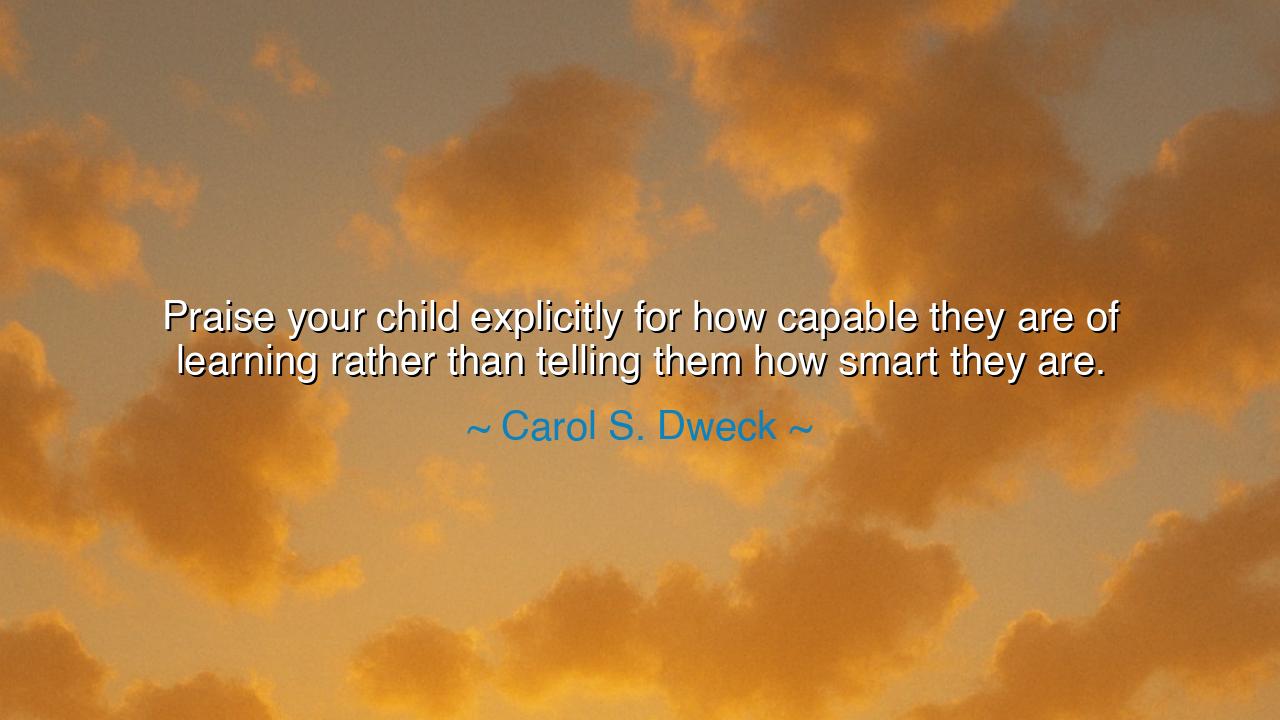
Praise your child explicitly for how capable they are of learning
Praise your child explicitly for how capable they are of learning rather than telling them how smart they are.






The words of Carol S. Dweck—“Praise your child explicitly for how capable they are of learning rather than telling them how smart they are.”—are a revelation born of deep insight into the human spirit. In these simple yet profound words lies a truth that reaches beyond education and touches the heart of how we grow, how we persevere, and how we understand our own worth. Dweck, a scholar of the mind and soul, reminds us that intelligence is not a gift fixed at birth but a flame that grows with effort and belief. Her teaching speaks to parents, teachers, and leaders alike: do not worship talent, for talent withers without struggle; instead, honor the strength of persistence, curiosity, and resilience—the sacred forces that make learning eternal.
In her research on what she called the “growth mindset,” Dweck discovered a quiet tragedy in how we often praise our children. When we tell them they are “smart,” we unwittingly bind them in chains of fragility. The child who believes their worth is measured by innate intelligence begins to fear failure, for each mistake feels like proof of inadequacy. But when we praise them for their capacity to learn—when we tell them, “You worked hard, you found a way, you learned this”—we free them. We teach them that growth comes from effort, and that failure is not a wall but a bridge to mastery. The difference is subtle, but the consequences echo through a lifetime.
The ancients, too, understood this wisdom, though they spoke of it in other words. The philosopher Aristotle once said, “We are what we repeatedly do. Excellence, then, is not an act but a habit.” He knew, as Dweck teaches now, that greatness is not inherited—it is forged through practice. The blacksmith’s arm grows strong by striking the iron; the musician’s ear refines through countless errors; the scholar’s mind sharpens through study and reflection. To call a child “smart” is to hand them a fragile jewel; to call them a learner is to hand them a sword that can cut through any obstacle.
History offers countless examples of those who triumphed not through innate brilliance, but through perseverance. Consider Thomas Edison, who failed a thousand times before lighting the world with the electric bulb. When asked how he endured, he replied, “I have not failed. I’ve just found ten thousand ways that won’t work.” Edison’s genius was not his intellect, but his faith in learning. Or think of Marie Curie, who toiled through endless nights of experimentation, breathing in dangerous fumes, chasing invisible truths until she discovered radium and opened the door to modern physics. These were not “smart” people in the shallow sense—they were learners, steadfast and humble before the mysteries of the universe.
Dweck’s wisdom is also a call to parents and teachers, the first architects of a child’s self-belief. She asks them to praise not the mountain summit, but the climb. To say, “You are capable of learning,” is to remind a child that their mind is a living forest, forever growing, forever renewing. It is to protect them from despair when they stumble, and to guide them toward courage when they face difficulty. The praise of effort over intelligence transforms failure from shame into instruction, and success from vanity into gratitude.
But this lesson is not for children alone—it is for every soul who has ever doubted their worth. Too many adults live imprisoned by the belief that they are either “smart enough” or “not smart enough.” Dweck’s teaching liberates them, for it reveals that the human mind is not a stone but a river—capable of carving new paths, deepening, widening, and reshaping itself endlessly. The one who continues to learn never truly grows old, for learning is the heartbeat of renewal. The capacity to learn is the greatest proof of human potential, and it belongs to all who choose to nurture it.
Thus, the lesson of this quote is both humble and heroic: praise growth, not glory. Teach children—and yourself—to find joy in effort, not validation in labels. When you see someone striving, recognize their courage, not just their result. When you fall, rise again knowing that failure is the soil from which wisdom grows. Let every home, every school, every heart become a place where learning is cherished more than being “right.”
For in the end, as Dweck’s words remind us, the mind is a garden, and praise is the rain that nourishes it. If we praise the roots—the effort, the curiosity, the endurance—the garden will flourish without end. But if we praise only the flower, it will wither in fear of the next storm. So let us speak to the learner within every soul, calling forth not pride, but perseverance. For the one who loves to learn walks the path of the eternal, and in that path, there is no limit—only light.






AAdministratorAdministrator
Welcome, honored guests. Please leave a comment, we will respond soon